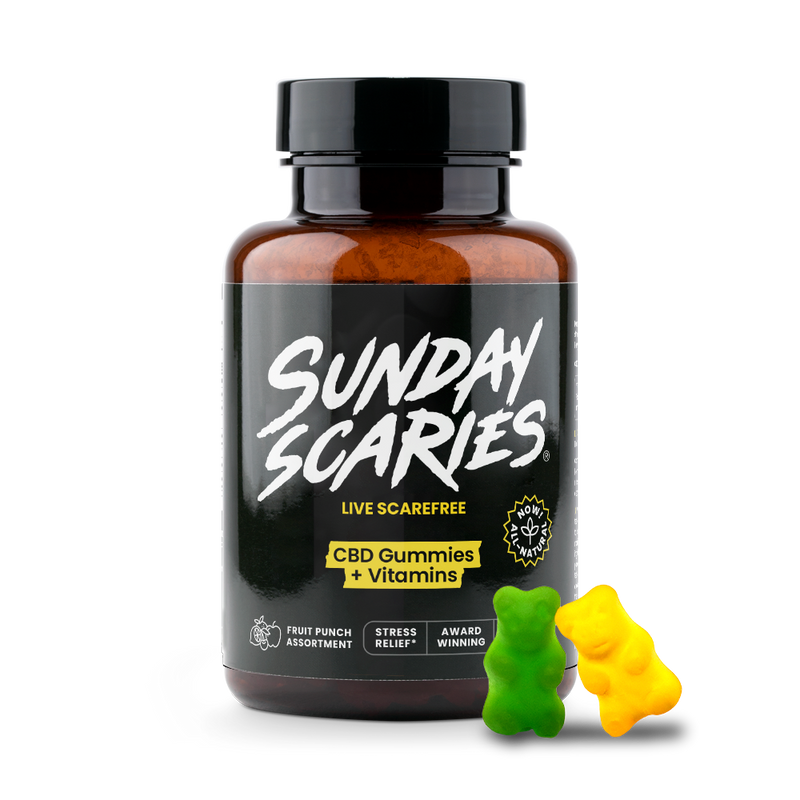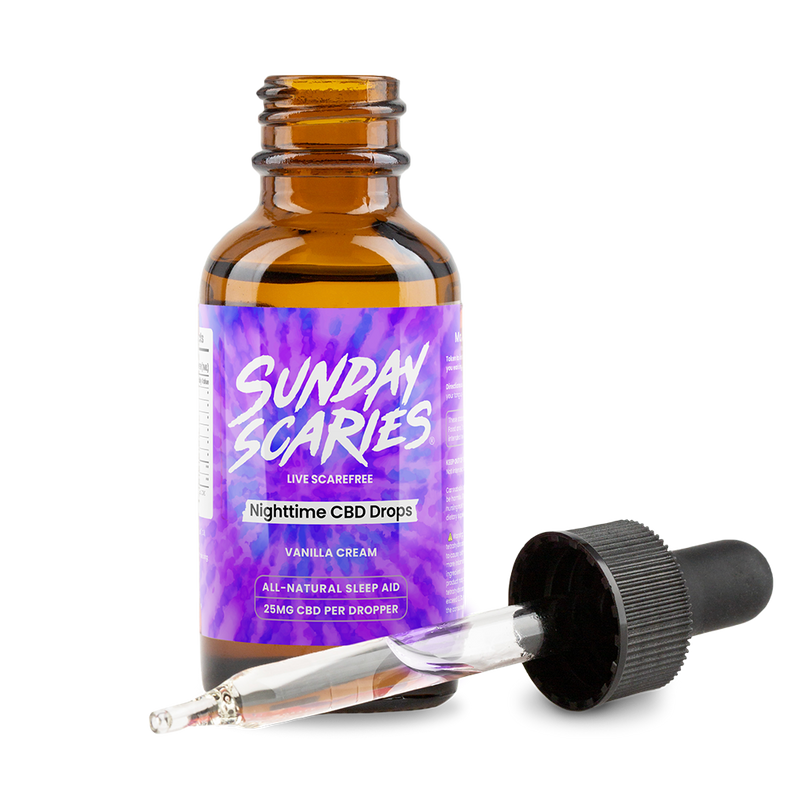
CBN vs CBD: Benefits, Differences, and How to Choose

CBD and CBN are cannabinoids derived from the cannabis plant; CBD is non-psychoactive and widely used for stress relief, body ache management and inflammation, while CBN is mildly psychoactive, primarily known for its sedative properties and potential as a sleep aid. Both offer distinct therapeutic benefits, making them suitable for different health needs.
Curious about the intricacies of CBD vs CBN? This article breaks down the differences, benefits, and how to choose the right one for your needs.
Key Takeaways
-
CBD (cannabidiol) and CBN (cannabinol) are two prominent cannabinoids from the cannabis sativa plant, each with unique benefits: CBD is widely researched for anxiety and pain, while CBN shows promise for promoting sleep due to its sedative properties.
-
Both CBD and CBN interact with the body’s endocannabinoid system, but in different ways: CBD prevents the breakdown of endocannabinoids to enhance their effects, while CBN interacts directly with receptors, particularly influencing sleep and mood.
-
Combining CBD and CBN can offer enhanced therapeutic benefits, particularly for sleep and body ache management, though starting with low doses and consulting a healthcare professional is advised to minimize potential side effects and adjust dosages effectively.
Understanding Cannabinoids: CBN and CBD
Cannabinoids are molecular compounds produced by the cannabis plant. Specifically, they are produced by the cannabis sativa variety.
Out of the 113 known cannabinoids, CBD and CBN are two of the most prominent, each offering unique benefits.
While CBD has been extensively researched, CBN is an emerging cannabinoid gaining attention for its potential health benefits, particularly in promoting sleep. As cannabinoid research progresses, we can expect to learn more about these fascinating compounds.
CBN, or cannabinol, is formed from the breakdown of THC as cannabis ages. Unlike CBD, which does not cause any psychoactive effects, CBN can produce mild psychoactive reactions, though they are much less pronounced than those caused by THC.
These two cannabinoids, despite their differences, interact with the brain’s receptors in ways that overlap, especially in terms of reducing anxiety and improving sleep.
-
If you're curious to learn more, check out our resource for a A Comprehensive List of Cannabinoids
What is CBD?
CBD is a non-psychoactive cannabinoid derived from the cannabis plant. It is one of the most studied cannabinoids and has gained significant popularity for its therapeutic benefits without the intoxicating effects associated with THC (tetrahydrocannabinol).
CBD interacts with the endocannabinoid system (ECS), which regulates various bodily functions such as mood, sleep, appetite, and immune response.
-
For more potential benefits, uses and safety insights, check out our resource: What is CBD?
What is CBN?
CBN, or cannabinol, is a lesser-known cannabinoid that forms as THC degrades over time. Found in aged cannabis, CBN has mild psychoactive properties, though they are significantly less intense than those of THC. This unique cannabinoid is gaining recognition for its specific health benefits, particularly in promoting relaxation and sleep.
CBN interacts with the ECS, particularly with the CB1 and CB2 receptors, influencing various physiological processes.
-
For more uses and effects, check out our resource: What is CBN?
Comparing CBD vs. CBN
When comparing CBD and CBN, it’s clear that each cannabinoid offers distinct advantages.
Benefits of CBD
1. Relieves Stress and Improves Mood: CBD is being studied for its anxiolytic and antidepressant effects. Users report potential benefits such as relaxation and boosts in happiness levels, highlighting specific scenarios for using CBD products - like when dealing with the aftermath of post-concert depression or hangxiety.
2. Pain Relief: CBD is being studied for its analgesic properties and whether it can help alleviate chronic pain by interacting with receptors in the brain and immune system. Potential therapeutic benefits include decompression and relaxation of muscles and joints.
3. Anti-Inflammatory: CBD is being studied for its anti-inflammatory properties and whether the effects can reduce inflammation and pain in conditions like arthritis and multiple sclerosis. More scientific research research needs to be conducted, but users are already reporting that CBD may help with migraines or how CBD may help with brain fog caused by swelling.
4. Neuroprotective: CBD is being studied for its neuroprotective properties and whether it can benefit conditions like epilepsy and neurodegenerative diseases. More research needs to be conducted to support any claims, but the FDA approved an epilepsy medication called Epidiolex. More prescription drugs may get approved as more research gets performed.
5. Skin Health: CBD is being studied for its potential to treat acne, eczema, and psoriasis due to its reported antioxidant properties. Many cannabis products on the market are advertised for skincare in topicals instead of as a way to consume CBD in ingestible form.
Benefits of CBN
1. Sedative Effects: CBN is being studied for its sedative properties, making it a potential aid for sleep disorders. Many users who have trouble sleeping incorporate CBN in to their nightly routine to induce sleep and stay asleep. CBN is better than other sleep aids in that it can help improve conditions associated with the Sunday Scaries or Sunday Blues, and users often report that they wake up much less groggy vs. using a melatonin supplement.
2. Pain Relief: Like CBD, CBN is being studied for its analgesic properties that may help alleviate pain. It's mostly used as a natural sleep aid, but users have reported it being beneficial in peripheral analgesics.
3. Anti-Inflammatory: Like CBD, CBN research is being conducted for its potential anti-inflammatory effects and whether it can benefit joint pain conditions like arthritis. Again, more research needs to be performed, especially for more severe health conditions.
4. Antibacterial: CBN is being studied as an antibacterial agent, and whether it can be particularly used against antibiotic-resistant strains of bacteria.
5. Appetite Stimulation: Unlike CBD, CBN is being studied for its ability to stimulate appetite, making it potentially useful for conditions that cause appetite loss.
Sleep Aid for CBN and CBD
Both CBN and CBD can improve sleep quality, but CBN’s stronger sedative properties make it particularly effective for promoting relaxation and deeper sleep. User reports indicate that people feel more rested and less anxious when using CBN, which helps them achieve higher quality sleep.
Higher doses of CBD sleep oil or full spectrum CBN oil taken an hour or two before bedtime can enhance these effects. Additionally, the combination of THC and CBN has been shown to produce stronger sedative effects than THC alone, underscoring CBN’s potential as a powerful sleep aid.
Using both CBD and CBN together can boost their effects, providing a complementary approach to improving sleep with the help of sleep aids. Same goes with the incorporation of THC, as we'll discuss later with the entourage effect.
Stress Management for CBN and CBD
CBN, while not as extensively studied, promotes calmness and may aid in stress-related sleep issues due to its mild psychoactive properties. Combining CBD with CBN can provide comprehensive support, addressing discomfort while promoting relaxation and other potential benefits for better sleep.
Side Effects of CBD vs CBN
-
CBD: Generally well-tolerated, but can cause side effects such as dry mouth, diarrhea, reduced appetite, drowsiness, and fatigue.
-
CBN: Limited research on side effects, but potential ones include dizziness, grogginess, and drowsiness due to its sedative properties.
Chemical Structure of CBD vs CBN
While both CBD and CBN are cannabinoids, they have different chemical structures. CBD is a direct derivative of cannabigerol (CBG), while CBN is a degradation product of THC. This difference in origin contributes to their distinct effects and interactions with the ECS.
Psychoactive Properties of CBD vs CBN
CBD is non-psychoactive, meaning it does not produce the "high" associated with THC. CBN, on the other hand, is a mildly psychoactive compound but not to the extent of THC. Its psychoactive effects are generally considered to be much weaker and almost unnoticeable.
Legal Status & Safety of CBD vs CBN
The legal status of CBD and CBN varies depending on the country and state. In the U.S., CBD is legal if derived from hemp and containing less than .3% THC by dry weight, following the 2018 Farm Bill, but its legality can differ if it comes from marijuana.
CBN’s legal status is less clear, often varying more widely, but just like the other major cannabinoids its being infused in CBD products across the U.S. and sold under the premise Farm Bill compliance.
Both CBD and CBN are generally considered safe and well-tolerated, but they can cause side effects such as drowsiness, low blood pressure, and interactions with medications. Third-party lab tests are crucial for ensuring the quality and safety of these products, verifying their purity and potency.
Different Products Containing CBD and CBN
CBD and CBN are available in various forms, including oils, capsules, edibles, vapes, and topicals.
CBD products are available in several forms, such as:
-
Pills
-
Patches
-
Creams
-
Oils
-
Tinctures
-
Vape pens
CBN products are available in several forms, such as:
-
Oils
-
Tinctures
-
Capsules
-
Edibles
-
Topicals
However, due to the complexity and cost of producing CBN, these products are generally more expensive than their CBD counterparts. This variety allows consumers to choose the best method for their lifestyle and health goals.
Combining CBD and CBN
Combining CBD and CBN can enhance their benefits, particularly for sleep. Using both cannabinoids together can provide more potent effects than using them individually, helping to tackle specific sleep issues more effectively. This combination can offer comprehensive therapeutic support from CBD and a relaxing effect from CBN.
The Entourage Effect with CBN and CBD
One of the most intriguing aspects of cannabinoids is the "entourage effect," where different cannabinoids and terpenes work together to enhance each other's effects.
Combining CBN and CBD, along with other cannabinoids, might provide more comprehensive relief and therapeutic benefits than using them individually. This synergy can be particularly beneficial in products designed for sleep relief and relaxation.
However, it is essential to start with low doses and gradually adjust to find the right balance in the early stages. Consulting a healthcare professional is recommended to minimize potential side effects and ensure optimal results.
Here are some steps to follow when starting with CBD and CBN:
- Start with a 1:1 ratio of CBD to CBN as a starting point.
- Begin with a low dose and gradually increase as needed.
- Monitor your individual response and adjust the ratio and dosage accordingly.
- Keep track of any side effects or changes in symptoms.
- Consult with a healthcare professional for personalized guidance and recommendations.
How CBD and CBN Interact with the Endocannabinoid System
The body’s endocannabinoid system (ECS) is a crucial part of our bodies, regulating functions such as sleep, mood, appetite, and memory. This system includes three core components:
- Endocannabinoids: These are molecules produced by our bodies that bind to receptors (primarily CB1 and CB2) to signal the ECS to act.
- Receptors: CB1 and CB2 receptors are found throughout the body and are responsible for receiving the signals from endocannabinoids.
- Enzymes: Enzymes break down endocannabinoids once their job is done.
Understanding these core components of the ECS can help us better understand how it functions and how it can be targeted for therapeutic purposes.
Both CBD and CBN interact with the ECS, influencing various bodily processes. CBD is believed to prevent the breakdown of endocannabinoids, thereby enhancing their effects and modulating receptors indirectly. On the other hand, CBN interacts more directly with these receptors, particularly those involved in regulating sleep and mood.
Together, they can help maintain a balanced internal environment, promoting overall well-being in the health and wellness space through complementary and integrative health.
Summary
In summary, CBD and CBN are two powerful cannabinoids with distinct benefits.
CBD offers a broad range of therapeutic applications, including stress relief, overall wellness improvement, and improved sleep quality.
CBN, on the other hand, is particularly effective for promoting sleep and relaxation. Understanding these differences can help you make informed decisions about which cannabinoid is right for your needs.
As the world of cannabinoid research continues to grow, so does our understanding of these amazing compounds.
Embrace the journey towards better health and wellness with the power of cannabinoids.
Frequently Asked Questions
What are the main differences between CBD and CBN?
The main differences between CBD and CBN lie in their effects - CBD is known for its broad therapeutic benefits, including stress relief and body ache management, while CBN is recognized for its strong sedative properties and effectiveness in promoting sleep.
Can CBD and CBN be taken together?
Yes, combining CBD and CBN can enhance their effects, especially for sleep. It's advisable to start with low doses and consult a healthcare professional to minimize potential side effects.
Are there any side effects of using CBD or CBN?
Yes, both CBD and CBN can cause side effects like drowsiness, low blood pressure, and medication interactions, so it's important to consult a healthcare provider before taking them.
What forms do CBD and CBN products come in?
CBD and CBN products come in various forms such as oils, capsules, edibles, vapes, and topicals. CBD products are more common, while CBN products can be pricier due to production complexities. Many CBD edibles also contain CBN in them.
Is there CBN in THC gummies?
Yes, THC gummies and Delta-9 gummies can contain CBN, as CBN is a byproduct of the degradation of THC over time, often enhancing the sedative effects of these edibles. Also, many THC gummies are full-spectrum, which means they contain other cannabinoids such as CBN.

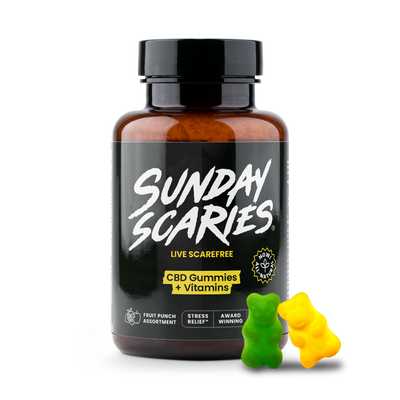 CBD Gummies
Stress Relief
CBD Gummies
Stress Relief
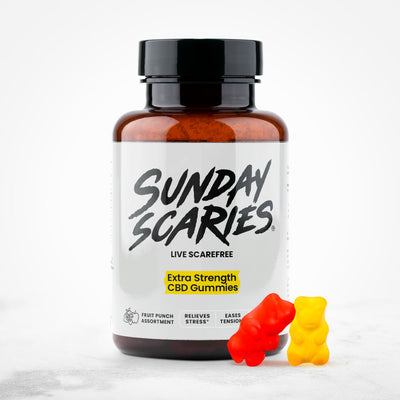 Extra Strength CBD Gummies
Stress Relief
Extra Strength CBD Gummies
Stress Relief
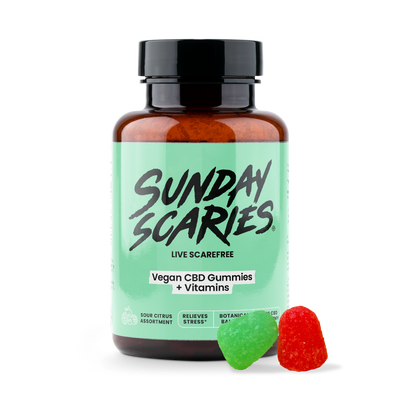 Vegan CBD Gummies
Stress Relief
Vegan CBD Gummies
Stress Relief
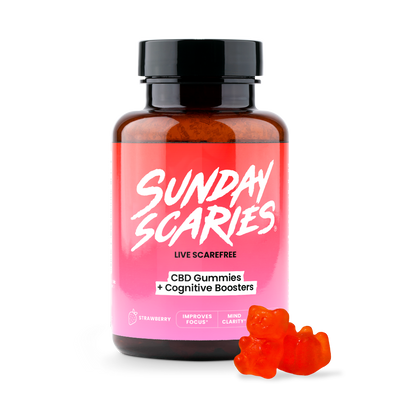 CBD Gummies for Focus
Focus Boost
CBD Gummies for Focus
Focus Boost
 CBD Candy
Mood Lift
CBD Candy
Mood Lift
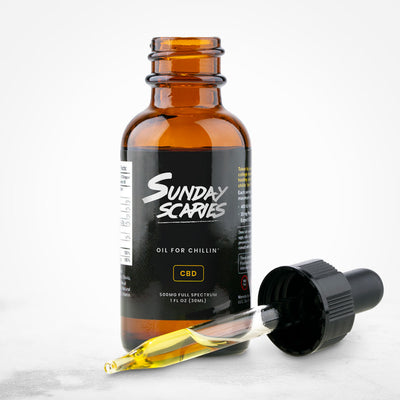 CBD Daytime Oil
Stress Relief
CBD Daytime Oil
Stress Relief
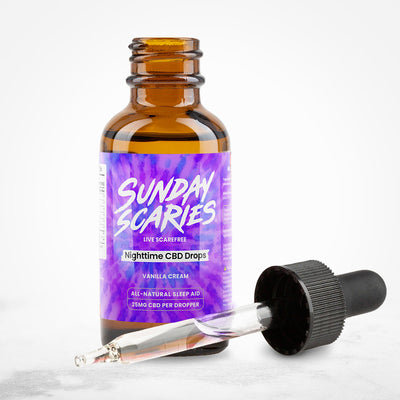 CBD Sleep Oil
Sleep Aid
CBD Sleep Oil
Sleep Aid
 CBD Dog Treats
Stress Relief
CBD Dog Treats
Stress Relief
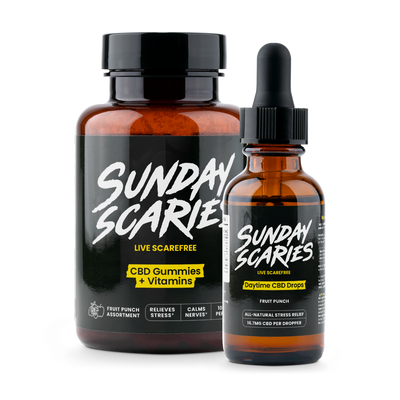 Side Piece Bundle
Stress Relief
Side Piece Bundle
Stress Relief
 Rando Bundle
Stress Relief
Rando Bundle
Stress Relief
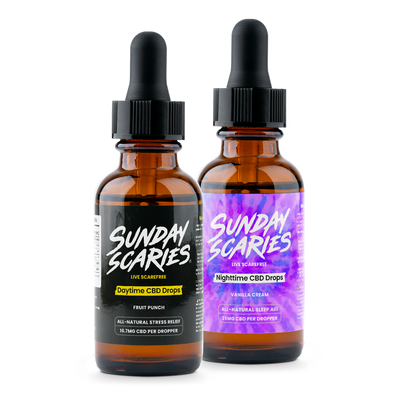 Sunrise & Sunset CBD Oil Bundle
Stress Relief
Sunrise & Sunset CBD Oil Bundle
Stress Relief
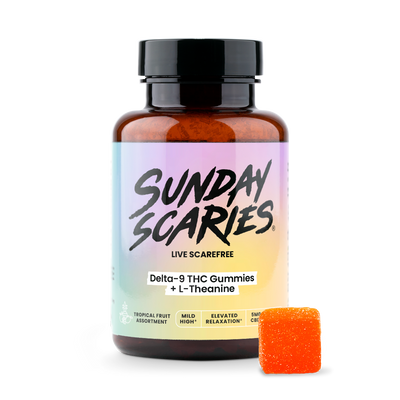 5mg Delta-9 Gummies
Euphoria
5mg Delta-9 Gummies
Euphoria
 10mg Delta-9 Gummies
Euphoria
10mg Delta-9 Gummies
Euphoria
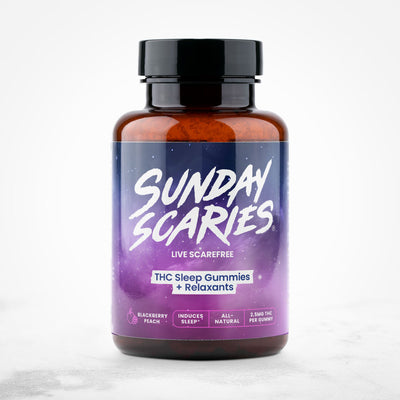 THC Gummies for Sleep
Sleep Aid
THC Gummies for Sleep
Sleep Aid
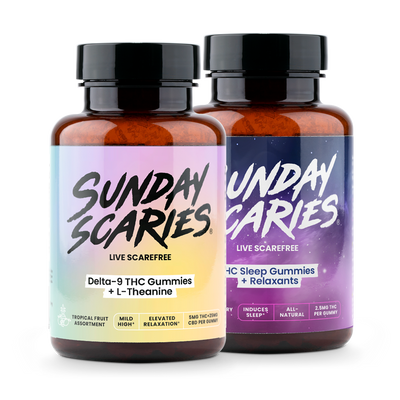 Day & Night THC Gummies Bundle
Stress Relief
Day & Night THC Gummies Bundle
Stress Relief
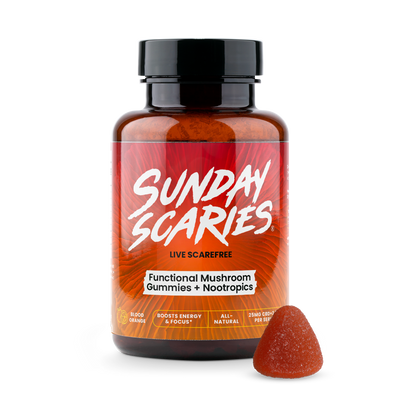 Mushroom Gummies
Focus Boost
Mushroom Gummies
Focus Boost
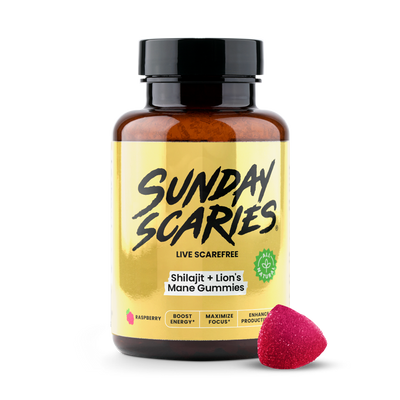 Shilajit Gummies
Focus Boost
Shilajit Gummies
Focus Boost
 Sunday Scaries Hat
Sunday Scaries Hat
 Sunday Scaries Dad Hat
Sunday Scaries Dad Hat
 Sunday Scaries T-Shirt
Sunday Scaries T-Shirt
 Sunday Scaries Pocket Tee
Sunday Scaries Pocket Tee
 Sunday Scaries Tank Top
Sunday Scaries Tank Top
 Sunday Scaries Sweatshirt
Sunday Scaries Sweatshirt
 Sunday Scaries Blanket Jacket
Sunday Scaries Blanket Jacket
 Sunday Scaries Sweatpants
Sunday Scaries Sweatpants

